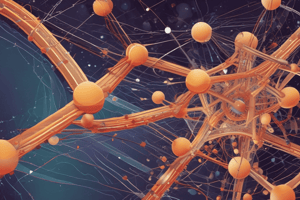Podcast
Questions and Answers
What is chemistry?
What is chemistry?
- The branch of science that deals with the composition, structure, and properties of matter (correct)
- The study of carbon compounds
- The study of non-carbon compounds
- The study of reactions and properties of matter
What is physical chemistry?
What is physical chemistry?
The branch of chemistry which deals with applying the theories of physics to the study of reactions and properties of matter.
What is organic chemistry?
What is organic chemistry?
The branch of chemistry which deals with studying carbon compounds.
What is inorganic chemistry?
What is inorganic chemistry?
What is biochemistry?
What is biochemistry?
What is analytical chemistry?
What is analytical chemistry?
What is a system of measurement?
What is a system of measurement?
What is the metric system?
What is the metric system?
What is a meter?
What is a meter?
What is a liter?
What is a liter?
What does nano- mean?
What does nano- mean?
What does micro- mean?
What does micro- mean?
What does milli- mean?
What does milli- mean?
What does centi- mean?
What does centi- mean?
What does kilo- mean?
What does kilo- mean?
What does mega- mean?
What does mega- mean?
What is mass?
What is mass?
What is weight?
What is weight?
What is density?
What is density?
What is Celsius?
What is Celsius?
What is absolute zero?
What is absolute zero?
What is kelvin?
What is kelvin?
What is a second?
What is a second?
What is precision in chemistry?
What is precision in chemistry?
What is accuracy?
What is accuracy?
What are significant figures?
What are significant figures?
What is an exact number?
What is an exact number?
What is matter?
What is matter?
What is a solid?
What is a solid?
What is a liquid?
What is a liquid?
What is a gas?
What is a gas?
What is melting point?
What is melting point?
What is boiling point?
What is boiling point?
What is plasma?
What is plasma?
What is a substance?
What is a substance?
What is an atom?
What is an atom?
What is an element?
What is an element?
What is a molecule?
What is a molecule?
What is a compound?
What is a compound?
What is a formula?
What is a formula?
Study Notes
Chemistry Overview
- Chemistry is the scientific discipline focused on the composition, structure, properties of matter, and the changes it undergoes.
Branches of Chemistry
- Physical Chemistry: Integrates physics principles to analyze the reactions and properties of matter.
- Organic Chemistry: Concentrates on carbon-containing compounds and their reactions.
- Inorganic Chemistry: Studies non-carbon compounds and their properties.
- Biochemistry: Examines the chemical processes within living organisms.
- Analytical Chemistry: Identifies substances in materials and quantifies their amounts.
Measurement Systems
- System of Measurement: A cohesive set of units used to measure physical quantities like length, mass, and volume.
- Metric System (SI): A decimal-based measurement system relying on units of ten.
Metric Units
- Meter: The fundamental unit of length in the metric system.
- Liter: The metric unit used for measuring volume.
- Prefixes:
- Nano-: Represents one billionth.
- Micro-: Represents one millionth.
- Milli-: Represents one thousandth.
- Centi-: Represents one hundredth.
- Kilo-: Represents one thousand.
- Mega-: Represents one million.
Basic Physical Properties
- Mass: Quantifies the amount of matter contained in an object.
- Weight: Measures the gravitational force acting on an object.
- Density: Defined as the mass of a substance divided by its volume.
Temperature Scales
- Celsius: Measures temperature with water freezing at 0°C and boiling at 100°C.
- Absolute Zero: Theoretical lowest temperature (-273.15°C) where molecular motion completely halts.
- Kelvin: Temperature scale starting from absolute zero, with each Kelvin unit equivalent to one degree Celsius.
Time Measurement
- Second: The basic unit of time in the metric system.
Experimental Measurements
- Precision: Refers to the repeatability or consistency of experimental results.
- Accuracy: How close a measured value is to the true or expected value.
- Significant Figures: Includes all certain digits in a measurement plus one uncertain digit.
- Exact Number: Results from counting, thus not subject to measurement uncertainty.
States of Matter
- Matter: Any substance that occupies space and possesses mass.
- States of Matter:
- Solid: Has definite shape and volume.
- Liquid: Has definite volume but takes the shape of its container.
- Gas: Lacks both definite shape and volume.
- Plasma: Composed of ions and free electrons, existing at extremely high temperatures.
Phase Changes
- Melting Point: The specific temperature at which a solid transitions into a liquid.
- Boiling Point: The temperature a liquid reaches to begin vaporization.
Matter Composition
- Substance: A material with distinct properties that differentiate it from others.
- Atom: The smallest unit of an element.
- Element: A pure substance that cannot be broken down into simpler substances via chemical reactions.
- Molecule: A cluster of two or more atoms bonded chemically.
- Compound: A substance that can be chemically decomposed into simpler substances.
- Chemical Formula: Symbolic representation of the types and numbers of atoms in a molecule.
- Pure Substance: Consistently possesses the same properties throughout.
Summary
These essential concepts in chemistry provide foundational knowledge for understanding chemical interactions, properties of matter, and measurement systems crucial for scientific inquiry.
Studying That Suits You
Use AI to generate personalized quizzes and flashcards to suit your learning preferences.
Description
Test your knowledge of key chemistry terms and their definitions with this set of flashcards. From general concepts to specific branches, this quiz provides an excellent way to enhance your understanding of chemistry vocabulary.




